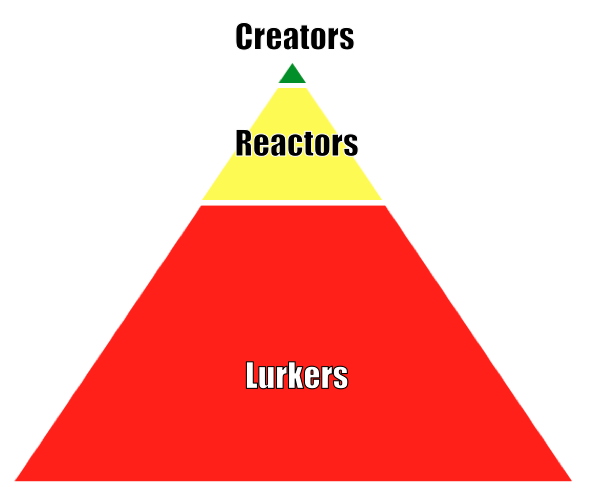When it comes to increasing a website's page rank in search engines, blog commentingis the preferred and most effective method.
Blog commenting is the section of a blog where readers can give feedback on each post; blog commenting is crucial to the success and popularity of a blog.
Now, let's take a quick look at how blog comments operate.
Participation Inequality
To comprehend why blog comments are so effective, one must first comprehend participation inequity.
This principle may alternatively be referred to as the 90:9:1 Principle or The One Percent Rule.
You could even extend a bit to include the Pareto Principle in this conversation.
The argument presented here is that the great majority of individuals merely observe without ever participating.
They are contentconsumers.
9 percent of the population may remark, share, or contribute in other ways.
However, the remaining 1 percent develop the content that is consumed.
People refer to these groups aslurkers, reactors, andcreators when describing them to others.
It is remarkable that many people have not yet grasped this concept.
They continue to be startled and outraged by the fact that over 90 percent of Yelp reviews come from less than 1 percent of consumers.
They contend that services like Twitter and Google+ are not feasible based on their low activity (defined as contribution).
What type of person do you believe was most likely to sign up for and use Twitter?
Lurker, reactor, or creator?
Give yourself an A+ if you responded creator.
Consequently, the proportion of users still Tweeting from those years is greater.
As the service gained greater popularity, more lurkers joined.
And that's alright!
Attempting to "correct" inequity in participation is a losing battle against human nature.
The majority of people will not create content for a variety of reasons.
Sure, technology may cause a slight shift in the percentages, but this dynamic will not change significantly.
Why Blog Comments Matter
They Grow Page Views
If a piece of content generates conversation, it is fascinating.
It's a call to action for users to read it.
In addition, media editors incorporate the most-discussed pieces into their newsletters, homepages, "editor's picks," etc.
The greater the number of comments, the greater the exposure.
They Complement A Content Piece
When someone does not comprehend something, they will post a question in the comments section.
You will respond to and fill in the gap, making the content more useful and valuable.
Comments Can Help To Convert A Reader
If the reader misunderstood something or the post lacked sufficient evidence, you have the opportunity to defend your position in the comments.
They Give You New Content Ideas
People comment about their annoyances.
You can glean helpful information from the general flow of thinking, such as what users lack in order to make a decision or what other topics they'd like you to cover.
Utilizations Of Blog Commenting For SEO
Commenting on blogs creates high-quality backlinks, drives targeted traffic to your blog, and raises your standing in the blogging community.
Blog comments are also known as the blog's bloodstream.
This will increase the number of visitors to your blog.
Blog commenting builds a conversation, and as the conversation grows, so does the relationship between you and your readers, resulting in an increase in blog traffic.
Blog commenting creates an interactive blogging community.
Commenting on blogs is also a great way to become well-known within a niche; this is the primary reason why people continue to use this technique.
Using plugins such as comment-luv and keyword luv, you can easily promote your blog's link.
When searching for places to comment, you are looking for blogs in your industry that are likely to receive traffic and engagement.
It is not essential that they rank among the most popular blogs, but they should be able to attract active members and have a substantial number of comments.
6 Tips For Generating More Blog Comments
Now that you understand the importance of comments on your blog, there are 6 things you should do to increase the number of comments on your articles.
Tip 1 - Be Brave, Unique, And Do Not Hesitate To Be Controversial
Although informative articles and suggestions are wonderful for generating visitors, they are not often recognized for sparking conversation.
If you want to get people talking about your material, you should write about topics that specialists in your businessare debating (e.g., steel vs. aluminum apparatus bodies), and don't be afraid to include your own opinion so that commentators have a side to argue for or against.
If you are unable to choose a side, ensure that you adequately describe both viewpoints so that others can offer their own arguments.
Remember that most people who comment on an article are seeking for a place to offer their viewpoint, so make it easy for them by writing about the topics that everyone in your field can't stop talking about.
Tip 2 - Utilize A Superior Blog Comment System
Even if you've written an amazing, thought-provoking article on a hot topic in your sector, a poor blog comment system could be discouraging more readers from leaving comments.
Does it need an excessive amount of personal information to post?
Perhaps it goes a step further and forces users to create an account prior to doing any action.
Do commentators have to wait for a moderator's approval before their post is displayed?
Can commenters simply monitor the responses?
Do your comments feature a rating system that recognizes the finest ones?
All of these factors, or their absence, could be holding back commentators.
In the majority of instances, the default comment system on your website will suffice; it all depends on how many hoops you require commenters to pass through first.
We keep ours simple by asking simply a first name and email address, and we provide commenters with the opportunity to subscribe to follow-up comments so that they can easily follow what others are saying.
Installing a social comment plugin, such as Facebook Comments or Disqus, where readers can use their social mediaaccounts to connect to a comment system and post a comment is another approach to keep things easy.
Not only does it eliminate the need to provide personal information, but readers should recognize it from other websites and recognize it immediately as a good location to voice their opinion.
Similarly, the rating systems employed by these plugins encourage readers to comment, as they are more likely to do so if they are aware that others can potentially "like" or approve their opinion.
Tip 3 - Seek Your Readers' Opinion
You're familiar with the proverb "ask and you shall receive".
When it comes to blog comments, the statement is accurate.
Although some businesses are apprehensive because they don't want to ask for contact, it's not so much begging as it is searching for a way to connect with your audience more effectively.
The more feedback your readers provide about a topic, the more you will learn about their preferences and viewpoints, so potentially impacting the types of content you publish in the future.
You'd be astonished at how many people are eager to spend a few minutes sharing their opinions if you let them know that their contribution is valuable.
Try encouraging more comments with these types of conclusions:
- “Has anyone else used this product in their applications? I’m curious to hear how it worked for you. Share your experiences in the comments below.”
- “We’d love to hear from our readers what you think about the new proposed regulations. Let us know in the comment section!”
- “Did we miss something? If you have any extra tips, please share them in the comments below.”
Tip 4 - Respond To Comments Readers Leave
If you want people to comment on your post, you should answer to as many as possible to demonstrate that you're listening and that they're not wasting their time.
People will be more likely to speak up when they feel the need to if they know you have a reputation for reacting to their comments.
Tip 5 - Ensure Your Comments Are Easy To Find
Have you ever wanted to leave a comment on a blog but couldn't find the comments section, only to discover that they're hidden behind a tiny link at the bottom?
While most businesses do this to save space and load time, it can discourage and prevent visitors from commenting on your blog.
Ask some strangers to read one of your blog posts, and then inquire if it would be simple for them to leave a comment if they so desired.
If the response is unanimously positive, you will know that your site's design is persuasive.
If not, ensure that your comments are not hidden and update your blog's design to make them easier to find and use.
Tip 6 - Treat Social Comments Like Blog Comments
Do not be alarmed if individuals leave comments on your social media posts for your blogs but not on your website.
People view social media as a more appropriate medium for expressing their opinions, so they may be more receptive to sharing their opinions on your LinkedIn post than on your website.
If this is the case, you shouldn't spend time attempting to get more people to comment on your blog; instead, you should concentrate on maximizing the number of comments on your LinkedIn page.
Although you will not be able to collect their contact information, the context of their comments will still be valuable.
It is irrelevant whether they comment on your blog on social media or on your website, as long as you get them talking.
While it's frustrating to spend a great deal of time creating content that seems to go unnoticed, it's important to remember that blog comments are merely a vanity metric that, in the end, don't mean much.
If people are converting on your CTA or providing their contact information in other ways, the fact that they are also leaving comments is irrelevant.
Obviously, comments are a great way to connect with your audience, learn more about them, and receive feedback, so it's never a bad idea to receive as many as possible.
Keep these guidelines in mind when writing blog posts and developing your website.
People Also Ask
Does Blog Commenting Still Work?
Yes.
Contrary to what (most) people believe, blog comments are still effective today.
However, quality trumps quantity when it comes to blog commenting (or link buildingin general).
You should also comment on blogs that are relevant to your niche and provide value to readers.
Do Comments Help SEO?
User comments can enhance the SEOvalue of a webpage by providing additional context.
If users stay on topic and leave comments pertinent to the page's content, then this data can aid in search enginerankings.
Should I Let People Comment In My Blog?
However, it is entirely up to individual preference.
If your comments section is costing you a lot of time, money, or stress, and your readers are not gaining much from it, you may want to remove it
Conclusion
Not only are the aforementioned pieces of advice applicable to the comments on guest articles or press releases, but they are also useful for the posts that you make on blogs and social media.
Therefore, give them a shot when you're managing the comments on your resource, and you'll quickly observe an increase in user engagement, loyalty, and conversion rates.


